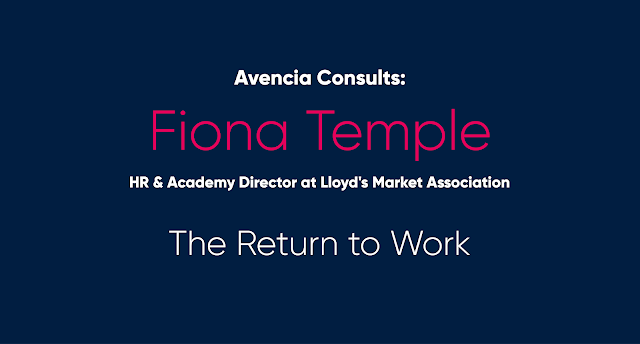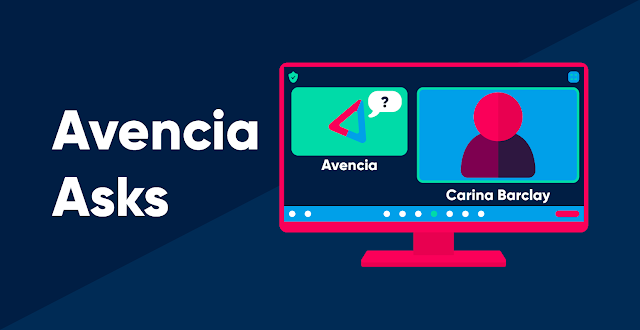What could the return to work look like for the Insurance industry? An expert view from Fiona Temple, HR & Academy Director at Lloyd’s Market Association.
Here at Avencia we have designed our ‘Avencia Consults’ blog post series to bring you first-hand insight, knowledge and expert advice from leaders within the Insurance industry.
We were recently joined by Fiona Temple, from the Lloyd’s Market Association (LMA), who provided her insight into how the Insurance market is reacting to the pandemic. Here is the second part of Fiona’s interview where she delves into what the return and the future of work could look like for the Insurance industry.
As organisations are beginning to put plans in place for a phased return to work, what do you think are the key HR considerations?
There are many considerations that employers, HR and employees need to take to be able to safely return to work and I anticipate views will change as time goes by as people are being guided by the government and local authority guidelines. Lloyd’s has taken the decision to not open the Underwriting Room until September in order to undertake and implement the necessary changes for a safe return.
One of the many considerations that needs to be made is the commute; the Mayor of London is following Government advice and has asked people to stay at home and only travel on public transport if essential. A safe commute to work needs to be considered before employees return to the office. Additionally, considerations and solutions need to be made for things such as those private and confidential negotiations or conversations which can’t take place in an open plan office, how employees will enter and exit a building due to social distancing requirements in lifts or how employees can social distance during a building evacuation, although this is probably the least of their worries! These are a few things people will be nervous and worried about upon their return.
There will be many different issues and challenges facing the HR function upon the return to work and they will play an integral part in a business’s ability to undertake cultural change and organisation redesign. Employers are liable for employee safety and need to be able to maintain social distancing, so the necessary risk assessments and consultation with staff cannot be rushed. HR need to provide updated policies such as flexible working, grievance and disciplinary policies and these need to be reviewed and implemented in advance of employees returning.
The recent enforced remote working will also have an impact on the return to work as people have proven that it’s the output that matters, not presenteeism and the usual 9-to-5. Many jobs can be done working from home, which will raise the question of ‘will the organisation need all that office space with an abundance of meeting rooms?‘ Hot desking will also certainly be prohibited for the foreseeable.
One of our clients is deciding not to return to the office, do you think many will follow this route or are you expecting the majority to adopt a phased return to the office?
I think people will be more traditional to start with and most will adopt a phased return to work. From an economic perspective we need to have some form of normality, however this will look very different with social distancing in place.
I believe most companies will need to look at flexible working practices, nobody wants to be the first to say, ‘look we went back first’ and then have issues after. If there is another spike in the pandemic and everyone goes back into lockdown, I anticipate some people will never return to the office.
Is it a company-wide decision, function by function or employee led? Why is this? Are you predicting any socio-demographic differences?
It must be a company-wide decision. Most employee’s employment contracts are between themselves and their employers at a specified address. However, with that said employers will be making sure their main asset, which is their people, feel safe to return.
I expect some people will want to go back to the office straight away as they will be missing the relationships and interactions, particularly generation Y and Z. However, some will not be able to go back which will affect the demographic; how are managers going to combat teams wanting to know why someone isn’t coming into work when they have an underlying health condition which the team can’t know about due to data protection legislation?
There will certainly be a lot of situations which we are not prepared for or experienced in and it’s going to be a challenging time for managers, leaders and employees.
How do you think this will influence mental health and well-being policies and approaches?
Mental health and well-being policies and approaches have become higher on the agenda of Executives. They want to make sure their company looks after their employees and are making sure they are supported wherever possible.
At the LMA we have daily team meetings across all our teams to make sure everyone is safe and well, as well as providing employees with well-being newsletters and access to a well-being app.
How is the LMA going to support HR leaders with these changes?
The LMA’s purpose is enabling the success of our members and the market through our expertise, connections and education. From a HR perspective, we have put together a HRD forum where people can come together once a month to chat and share best practice. The LMA are bringing this community together in a way which has never been done before.
Additionally, we have distributed six HR surveys across the market, which were based around a variety of different topics: Covid-19, the return to work, lockdown, all of which were filled out anonymously.
I have never seen the market come together so well during a crisis. I think the HR teams across the market should be commended for all the hard work they have put in, often behind-the-scenes, to make sure employees are looked after during such an unprecedented and uncertain time.
If you would like to keep up to date with our Avencia Consults blog series and all other Avencia news and information you can follow us on LinkedIn to receive instant updates.




Comments
Post a Comment